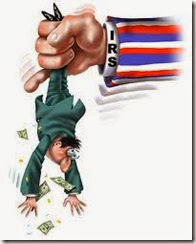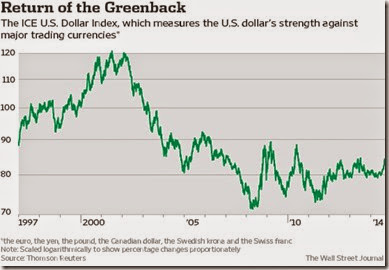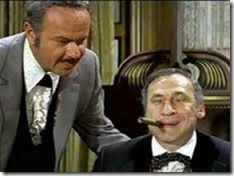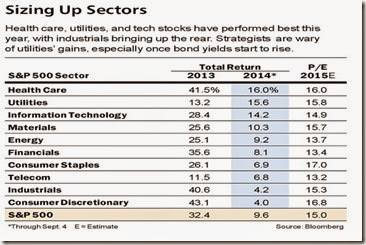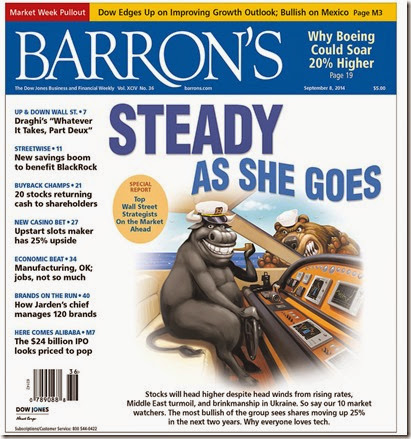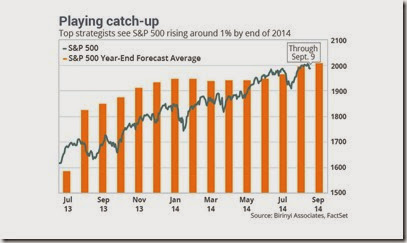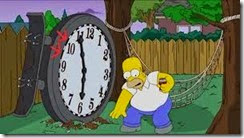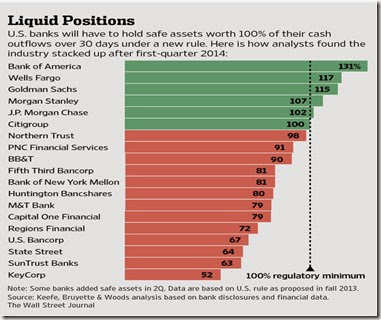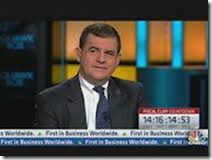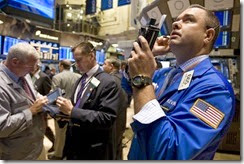 BAD NEWS FIRST. Thursday Markets Fell. Stocks were slammed globally and the plunge showed no favorites as it was an equal opportunity rout. It was the worst trading day since last July with the DJIA off more than 260 points at the close.
BAD NEWS FIRST. Thursday Markets Fell. Stocks were slammed globally and the plunge showed no favorites as it was an equal opportunity rout. It was the worst trading day since last July with the DJIA off more than 260 points at the close.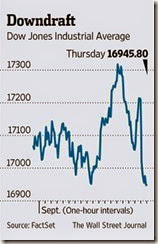 The S&P 500 Index broke its 50 day moving average, which was major support for the market on Wednesday. Art Cashin, on CNBC, wondered if this sell-off was the beginning of something big. He admitted not knowing exactly what was the catalyst for selling except that it was broad based and may be setting it up for ‘one of those September-October things’. The sell-off wasn’t limited to any particular portion of the market. One bit of news/rumor alleged that in Moscow a pro-Kremlin legislature wants to allow seizures of foreign assets. That bit of news with countries with close economic relations with Russia caused concern. Rex Macey, chief allocation officer at Wilmington Trust Investment Advisors, said he would be surprised if the correction reached 10% before it ended. ‘The economy is doing too well and profits are doing too well, for the kind of 10% correction you may think about.’ In other news few money managers expect a large stock decline as they expect the U.S. economy to keep growing solidly. Jim Cramer came out on his CNBC show and told viewers to sit tight. Cody Willard at MarketWatch.com said he thinks the we’re in a bubble-blowing bull market with years to run but that doesn’t mean the market won’t correct 10% or more within a bubble-blowing bull market context. Info from various sources including live CNBC 9/25, Bloomberg.com., WSJ and MarketWatch.com
The S&P 500 Index broke its 50 day moving average, which was major support for the market on Wednesday. Art Cashin, on CNBC, wondered if this sell-off was the beginning of something big. He admitted not knowing exactly what was the catalyst for selling except that it was broad based and may be setting it up for ‘one of those September-October things’. The sell-off wasn’t limited to any particular portion of the market. One bit of news/rumor alleged that in Moscow a pro-Kremlin legislature wants to allow seizures of foreign assets. That bit of news with countries with close economic relations with Russia caused concern. Rex Macey, chief allocation officer at Wilmington Trust Investment Advisors, said he would be surprised if the correction reached 10% before it ended. ‘The economy is doing too well and profits are doing too well, for the kind of 10% correction you may think about.’ In other news few money managers expect a large stock decline as they expect the U.S. economy to keep growing solidly. Jim Cramer came out on his CNBC show and told viewers to sit tight. Cody Willard at MarketWatch.com said he thinks the we’re in a bubble-blowing bull market with years to run but that doesn’t mean the market won’t correct 10% or more within a bubble-blowing bull market context. Info from various sources including live CNBC 9/25, Bloomberg.com., WSJ and MarketWatch.com
USA Today published a pre-retiree checklist. Here’s a few ideas to consider/do before retirement:
- Prepare a budget for retirement. Different than what you’d be spending while working. Less money for clothes, outside lunches, etc.
- Check your emergency fund.
- What to do with your health insurance. Options? Add dental and/or vision benefits. Medicare will not provide or cover.
- Review your life insurance.
- Where do you want to live?
- Meet with an accountant to get estimate of federal and state taxes.
In Pursuit of Happiness Sanjay Gupta, MD explores scientifically proven ways to increase your life satisfaction. People who are happy live longer and are healthier.  The Danes are the happiest people in the world. Think Victor Borge who said, ‘The shortest distance between two people is a smile.’ Here’s a few tips on getting happy.
The Danes are the happiest people in the world. Think Victor Borge who said, ‘The shortest distance between two people is a smile.’ Here’s a few tips on getting happy.
- Change your attitude.
- Work less.
- Focus on experiences.
- Build up social network.
- Volunteer.
- Laugh- a lot.

I’ll discuss when you should be buying fixed investments at the annual client meeting. Remember- as interest rates rise, principal falls.
Monday Markets Fell Most in 7 Weeks. DJIA Losing +100 points. Concerns were about slowing China growth and fall in home sales. Scott Wren, Equity strategist at Wells Fargo Advisors said, ‘There is a lot of hype out there that the economy is going to consistently accelerate at a better rate of growth. I’m in the camp of modest growth and modest inflation, that’s not going to change anytime soon.’ Bloomberg Businessweek News 9/22/2014.
Bob Doll, CFA, in his Nuveen Asset Management Commentary for September 22, 2014 reported:
- Commodity prices will continue to fall.
- Small caps have underperformed in 2014 and trend is expected to continue.
- Third quarter growth appears to be tracking close to 3.5%
- Period following mid-term elections has been historically strong for equities.

Tuesday markets carry over losses from Monday as the reason du jour was bombings in Syria and drug makers fell on the crackdown on tax-saving mergers, allowing U.S. companies access to foreign cash without paying U.S. taxes. It was the third day of losses in a row for the markets. Bloomberg.com 9/23/2014.
Small Cap stocks big losers over the last 12-months and we’ve seen the Russell 2000 Index 50 day moving average cross over the 200 day which is called a Death Cross. Some analysts see this as the beginning of a Bear market. Others point to historical trends which illustrate once this Death Cross happens the small caps have a tendency to rally.
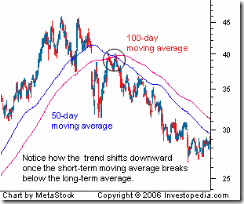 Info from Investopedia, WSJ, Barrons.com and Bloomberg.com
Info from Investopedia, WSJ, Barrons.com and Bloomberg.com
Cramer on CNBC Tuesday 9/23 said he’d only be buying two companies at this point in time. One is in tech and the other in pharmaceuticals. Wednesday markets took off as investors piled on after a three day losing streak. DJIA +150 points.
 Questions on what will happen when the Fed does raise rates answered by Howard Gold who wrote in his MarketWatch.com Op piece 9/24 that stocks fell 13 out of 16 times the Fed raised rates. The S&P 500 lost 10% on average. But, if you continue to look at the numbers, within 6 months the markets were UP 1.3% after the first rate hike. Usually markets will start their correction about six months before the first rate increase. What investment sectors performed the best in a rising rate environment? Gold reports technology, energy and materials. What to avoid would be those sectors that are interest rate sensitive like financials, utilities and telecom.
Questions on what will happen when the Fed does raise rates answered by Howard Gold who wrote in his MarketWatch.com Op piece 9/24 that stocks fell 13 out of 16 times the Fed raised rates. The S&P 500 lost 10% on average. But, if you continue to look at the numbers, within 6 months the markets were UP 1.3% after the first rate hike. Usually markets will start their correction about six months before the first rate increase. What investment sectors performed the best in a rising rate environment? Gold reports technology, energy and materials. What to avoid would be those sectors that are interest rate sensitive like financials, utilities and telecom.
Questions call Paul@ 586 295 0430 or write him at pstanley@westminsterfinancial.com. Share this blog with someone who cares about their money.
SECURITIES OFFERED THROUGH WESTMINSTER FINANCIAL SECURITIES, INC. MEMBER FINRA/SIPC

